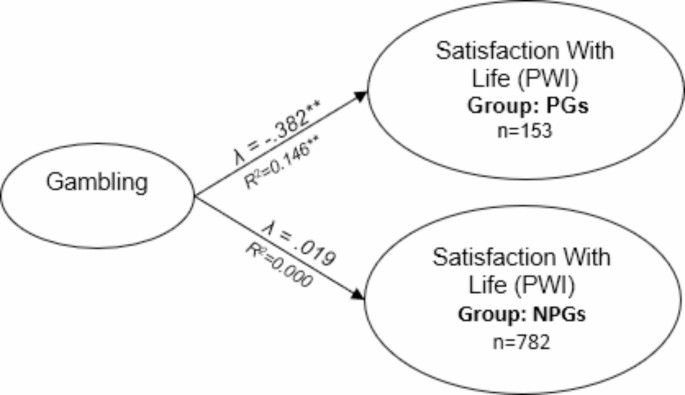Gambling
Problem gambling and subjective well-being: results of a study with a representative sample in Santiago (Chile) – Scientific Reports

Games of chance, or gambling games, correspond to a type of game that has as a distinctive feature the fact that players cannot control, or only in some way, the outcome by resorting to their skills or by finding systematic ways to win, but instead depend mainly on chance1. These games, such as lotteries, slot machines, roulettes, bingo, poker or sports betting, differ from other recreational activities in that their outcome entails either reward or loss, usually in the form of money2.
Recent estimates indicate prevalence rates of gambling disorder among current adult gamblers ranging between 0.12 and 5.8% worldwide3, but these figures are higher when problem gambling is also taken into consideration4. Gambling (not only gambling disorder, but also problem gambling, which is increasing is growing due to the spread of the Internet), can cause negative events when individuals begin to experience detrimental effects on their lives. These harmful effects can occur both at intrapersonal and interpersonal levels. In intrapersonal terms, individuals can have negative emotional experiences related mainly to craving to perform the activity, or as feelings of tension and loss of control when favorable gambling results are not obtained, and even reach levels of dependency5. In an interpersonal level, gambling can also damage family and couple relationships, financial and employment status, and can even lead to legal problems2,4,6.
Apart from criteria for the clinical diagnosis of gambling disorder, provided by the Diagnostic and Statistical Manual (DSM) of the American Psychiatric Association7,8, it is also convenient to consider gambling as recreation, which does not create any problems (NPG), and gambling as a dependence-inducing activity (PG)4. For this reason, the term ‘problem gambling’ (PG) has often been used in the literature to refer broadly to excessive gambling, which affects the individual and social spheres, even if the activity fails to meet the DSM diagnostic criteria9.
There is concern about a trend towards diversification and easier access to gambling, due to the increase in electronic machines and online gambling2,10. Several authors suggest that sectors of the population, such as young people, whose gambling participation was previously low, now have greater access and, at the same time, increased PG rates10,11. Due to this greater access to the game, the study that examines the consequences of gambling becomes necessary.
There is a close relationship between problem gambling and subjective well-being (SWB). On the one hand, excessive gambling has a negative impact on different areas of people’s lives, including their well-being12. Problem gambling can have severe consequences on various aspects of an individual’s life, including health problems, such as depression, substance abuse, emotional distress due to financial strain, physical health issues (neglect of physical health due to a preoccupation with gambling, resulting in poor nutrition, lack of exercise, and overall neglect of one’s well-being), comorbidity with other mental disorders or even suicidal ideation. These chronical consequences are also associated to an impaired quality of life and to a social isolation5,6,13,14.
On the other hand, gambling as recreation can contribute to people having fun, socializing with others, and experiencing pleasant sensations15,16, which could have a positive impact on well-being. In the case of problem gambling, positive and negative consequences are unbalanced, and the negative consequences can affect various dimensions of the life of individuals (as previously argued), including their well-being. In this study problem gambling is studied, instead of other addictions, because there are some specific problems related to it, such as debts, unpaid loans, problems with Justice, which may not be present in other addictions and which are related to subjective well-being of the people involved5.
Conceptually, SWB refers to the hedonic dimension of well-being and has two components: one cognitive and one affective17. The cognitive component is satisfaction with life (SWL), defined as the cognitive evaluation an individual makes of their general quality of life. The second component refers to the balance between positive and negative affect17. The present study will focus on SWB in terms of the former (SWL).
Several studies have found that SWL is lower in people with problem gambling than in people without these issues16,18. Studies in older adults have shown that the probability of gambling is lower as SWL increases19. However, older adults who gambled reported greater well-being than older adults who did not participate in games of chance. In addition, there were differences compared with younger groups, for whom gambling is associated with reduced well-being15.
Entertainment is the main objective of gambling, while losses do not exceed the budget that is taken to gamble20 and may neutralize possible negative associations between gambling and SWB. Desai et al15., in a study conducted with older adults who participated in gambling for recreational purposes, found that gambling could have beneficial effects, such as providing the opportunity to share with others, as well as sensory and cognitive stimulation. Thus, as long as people obtain the positive aspects of participating in gambling without falling into problematic gambling, they can make positive assessments regarding their lives and well-being. However, problematic gambling can probably erode this potential increase in social integration, because of the conflicts associated with excessive gambling mentioned above. Going deeper, problematic gambling has been identified as a significant factor in the deterioration of social integration, often leading individuals to isolation and loneliness. This occurs because people who experience gambling problems tend to become absorbed in gambling activities, neglecting their social relationships and responsibilities. Research suggests that problem gambling is associated with increased feelings of guilt, depression, and social isolation, which negatively impact an individual’s ability to maintain social support networks21. Additionally, problematic gambling can strain interpersonal relationships due to financial losses and emotional dependence on gambling22. On the other hand, recreational and controlled gambling, when managed responsibly, can promote social integration and provide emotional benefits. Participating in moderate gambling activities within social settings, such as casinos or community games, can foster social interactions and offer opportunities for individuals to enjoy companionship and share experiences. Such interaction fosters social support, which is critical for emotional well-being, as individuals feel supported and have someone to turn to during times of need23.
Finally, it is important to remark that gamblers report higher levels of illusion of control, not only in respect to gambling24, and that positive illusions are positively related to well-being, because they reinforce self-esteem and efficacy25.
The topic addressed in this study is important because there is little research that relates problematic gambling (not pathological gambling) with subjective well-being, the sample is large and it is the first epidemiological study carried out in Chile on this topic.
Considering that there are other relevant variables (health, sociodemographic variables, individual characteristics, behavioral variables and life events), the purpose of this article is to analyze the specific association between problematic gambling and SWL. Using a representative sample of the population over 18 years of age in Santiago of Chile, the following hypotheses were tested:
Hypothesis 1
Individuals who are categorized as people who experience gambling problems (PGs) will show lower levels of SWL than those classified as people who do not experience gambling problems (NPGs).
Hypothesis 2
Individuals who declared not to gamble in the last year show similar levels of SWL as individuals who declared to gamble and qualify as NPGs.
Hypothesis 3
Individuals categorized as NPGs who declare gambling in the company of others will have higher levels of SWL than those who declare doing so by themselves.
Hypothesis 4
Problem gambling will mainly affect SWL domains that are related to social, such as personal relationship and community connection domains. On the other hand, personal security, life achievement, and future security will be less negatively impacted.
Hypothesis 5
Gambling has a negative effect on SWL of PGs, while it has no effect on SWL of NPGs12,15,16..
The present study examines the impact of gambling on subjective well-being (SWB) and life satisfaction (SWL), highlighting the distinct effects between people who experience gambling problems (PGs) and people who do not experience gambling problems (NPGs). It would be expected that excessive gambling would negatively affect multiple life domains, including emotional health, relationships, and financial stability, contributing to lower SWL among PGs compared to NPGs (Hypothesis 1). Conversely, individuals who did not gamble in the last year would be expected to demonstrate similar SWL levels to NPGs, suggesting that recreational gambling, when not excessive, would not harm well-being (Hypothesis 2). Moreover, NPGs who would gamble socially would be expected to experience enhanced SWL due to the socialization and positive affect associated with group activities, unlike those who would gamble alone (Hypothesis 3). Problem gambling would particularly deteriorate SWL in social domains like personal relationships and community connections, while areas such as personal security and life achievements would remain less impacted (Hypothesis 4). Finally, the study would underscore that while gambling would diminish SWL among PGs, it would not significantly affect the SWL of NPGs, reflecting the balance of positive recreational effects and negative outcomes associated with excessive gambling (Hypothesis 5).










